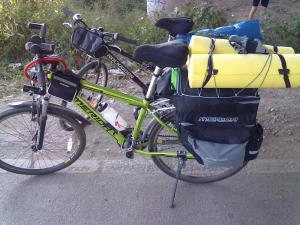A few days ago this story came out about a Japanese cyclist who was trying to ride around the world, only to have his bike stolen in China.  When he described his plight on the web, netizens and Wuhan police snapped into action and his 13,000 yuan bike was recovered days later. Predictably, many Chinese weren’t so pleased with this happy ending.
When he described his plight on the web, netizens and Wuhan police snapped into action and his 13,000 yuan bike was recovered days later. Predictably, many Chinese weren’t so pleased with this happy ending.
It was a relief to see very few comments gratuitously invoke the Nanjing Massacre, but there were plenty of responses like, “A foreigner losing his bike and appear on television and become news, but what about when a local Chinese person loses his bike? Who would report that?”
People’s Daily urged local authorities to serve the needs of the common Chinese people in the same way that they did the Japanese cyclist. And Global Times ran piece saying, “A simple bike has seemingly reflected an embarrassing situation, namely that Chinese still cannot view foreigners equally. People are still too sensitive to foreign evaluations of the country and confined to an inferior mentality.”
People’s Daily is absolutely right that authorities should extend much more effort for common Chinese. Since the media usually isn’t free to expose police ineptitude or corruption, many forces are lazy do-nothing outfits that won’t raise an eyebrow unless there’s something in it for them.
But the anger over this particular story has gotten a bit out of hand. First of all, the way the story unfolded was very tongue-in-cheek. Bored netizens found their cheeky cause of the day and managed to deliver on their largely satirical mission – which is what made it newsworthy.
Also, this wasn’t just an everyday bike theft. This was a foreign traveler who lost his means of transportation an ocean away from home. I often travel in this way and dread the day when my bike gets stolen in the middle of nowhere. You can’t just go to the local bike shop and pick up a new one. In Nanjing it took me weeks to find and soup up a bike capable of long-distance travel. And the logistics of just returning home would be a nightmare. There’s awkward-to-carry gear, unexpected costs, and who knows how many legs of travel would be required.
If I heard a foreign cycler was travelling through Kansas City and had his bike stolen, I’d expect police to devote more attention to the case than a standard local theft. He’s alone and stranded in a strange land. The bike’s importance is much more than its cash value.
Still, there are plenty of Chinese in much more desperate situations that go completely ignored. But I don’t think the case of the Japanese man paints a very realistic picture of foreign vs. local treatment. In Nanjing I once had a 2,000 yuan electric scooter stolen. When I reported it to the police they filled out the standard paperwork and went about ignoring it just like they did with the Chinese.
Yes, foreigners in desperate need of help from authorities probably are more likely to get it in most situations; but that’s not really unique to China. Police are typical human beings. A person in trouble who’s alone and can’t speak the language or navigate the cultural complexities will usually elicit more sympathy than a local with family, friends, and a grasp on how things are done.
But are foreigners given special treatment in general by Chinese because of an inferiority complex?
We’ll look at that tomorrow…
